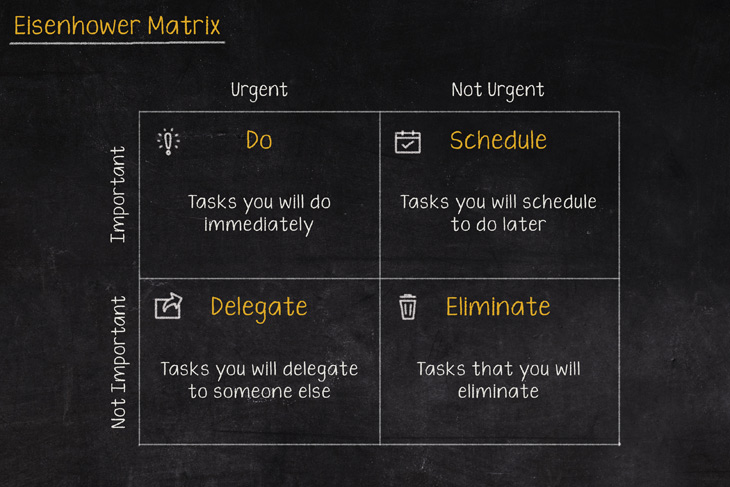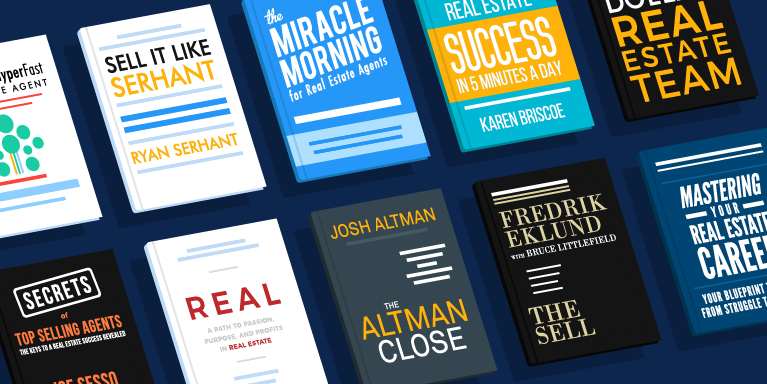Why are some people far more productive and effective than others? It usually comes down to their habits and mindset. Check out an overview of the book "7 Habits of Highly Effective People" and how these lessons can be applied to real estate.
Industry Insights
In the past, we’ve published a couple of lists of our favorite books you need to check out if you’re a real estate agent. One of the books we mentioned in our first list was “The 7 Habits of Highly Effective People.”
This book constantly tops top-10 book recommendations for entrepreneurs, real estate agents, and anyone looking to improve their personal productivity. Its lessons have stood the test of time, and can be applied to all industries, lifestyles, and age groups.
In today’s article, we’ll do a quick summary of its lessons, as well as how they can be applied in real estate. However, we seriously recommend that you get yourself a copy of the book (either in print or as an audiobook), and carefully study it.

Why Do We Need To Re-Examine Our Habits
We all have habits, both good and bad. Some of them we are aware of, and some we don’t even realize we have unless someone points them out. While some of our good habits DO come naturally, the majority don’t and require constant effort to maintain. Why? Because our brains are wired for minimum effort. It’s the reason why it’s so much easier to sit on the couch all day eating junk food, than actually hitting the gym and sticking to a healthy diet.
The main purpose of this book is to teach us to identify some of our most damaging habits and replace them with upbuilding and productive ones.
Unlike so many courses and self-help books that promise quick fixes and mental hacks to make you more productive, this book acknowledges that real and long-lasting improvement requires focus and discipline.

Habit 1: Be Proactive
Unlike animals, which operate primarily on instinct, humans have the ability to self-reflect, make fundamental changes about how we perceive the world (paradigm shifts), and we can actively change the way we react to situations around us.
But that ability to actively make such changes in our lives isn’t a skill we are born with. Newborns are completely helpless and dependent on their parents. But as we grow up, we become more independent, more capable of action, and better equipped to make decisions.
However, even though most adults have the ability to reflect on their life and establish good habits the reality is that most of them won’t. Why? Because most people never completely leave that childlike “dependent mentality.” They are reactive. The world happens to them, and they are not active participants in determining their own destiny.
In real estate, you can EASILY identify reactive agents, since they often make expressions such as:
- “My broker never gives me any leads. No wonder I’m so behind my sales cap.”
- “Zillow just makes it impossible to compete.”
- “I just joined real estate at the wrong time. That’s why I’m not getting any leads.”
Proactive people, on the other hand, recognize that they are NOT completely at the mercy of the world around them. Regardless of their situation, they always have the ability to at least control how they respond to any given situation (or as the book puts it, “response-ability”)
How can a person go from being reactive to proactive? By changing where they spend their mental energy.
Covey introduces the idea that each person has two circles: a circle of concern and a circle of influence.
Our circle of concern includes a wide variety of things: climate change, feeding your family, society norms, the traffic in the morning, paying your bills, etc.
Some items in our circle of concern we can do something about. Others, you can’t. But constantly spending mental energy on things outside of your control is as futile as shouting at your TV. And that’s time and energy that you can never get back.
On the other hand, our circle of influence (which is always smaller than our circle of concerns) includes the things that you CAN do something about.
If you focus on the things that you CAN influence, you’ll make real and effective changes in your life. And the more you focus your energy on your circle of influence, the more that circle will grow.

Habit 2: Begin With The End In Mind
Habit number 2 is all about determining what’s important in your life, and what your end goals are. How can you determine what really matters to you?
Imagine that you’re attending a funeral. But this particular funeral is special since it’s your own funeral. What would people say about you? How would they remember you as someone that made their community a better place, a loving parent who always provided for their family?
How do you wish to be remembered? Would your life change if you knew you only had 30 days left to live?
While grim, this mental exercise helps us to put into perspective how our lives are right now, and what’s really important in your life.
If someone were to ask you “What’s the most important thing in your life?” or, “What motivates you to get out of bed each morning?”, what would you say? Is it because you wish to feed your family? The need to give back to your community? The overwhelming desire to become financially independent?
The reality is that there’s often a huge disconnect between what we claim to be important in our lives and what we actually do with our time. A person may say that achieving financial independence is the most important thing in their life. And yet they never save money, they waste a ton of time in the office, and never bother to sit down and plan how exactly they ARE going to reach financial independence.
Most of us find it easy to be “busy.” But if we don’t have an end goal in mind or a “personal center based on a guiding sense principles” we won’t know if we’re heading in the right direction, or even in a direction at all.

Habit 3: Put First Things First
Our time is limited, and it’s very easy to let distractions, social expectations, and trivial matters creep in and choke our productivity.
To be an effective real estate agent, you need to use your time and energy in a way that will get you closer to your ultimate end goal (which we talked about in Habit 2). You also need to be disciplined enough to do what needs to be done, and not be governed by your every desire or impulse at any given moment.
A tool that can help you be more efficient with your limited time is the Eisenhower time management matrix.
All of your tasks can be categorized using two variables: importance and urgency.
Your own personal time management matrix could look something like this.
| Urgent | Not Urgent | |
| Important | Quadrant I
Closing appointment Deadline-driven projects Following up on offers |
Quadrant II
Relationship building Reaching out to your community Planning marketing strategies Taking care of your health |
| Not Important | Quadrant III
Interruptions Certain calls and meetings Answering certain emails |
Quadrant IV
Office politics Gossip Personal social media accounts |
Items on Quadrant I are urgent AND important. They need to be done ASAP. However, we have the tendency to spend things that may SEEM to be urgent (Quadrant III), or are fun and easy to do (Quadrant IV) but don’t help you be a more effective real estate agent.
Click the button below to learn more about pricing.
Sadly, we often neglect activities that may not seem urgent but are essential to your success as a real estate agent (Quadrant II).
However, it is those often neglected tasks on Quadrant II that actually determine your long-term success as a real estate agent. It deals with things such as building relationships, and long-term planning. All of these things we know we need to do, but we rarely get around to doing them because they don’t FEEL urgent.
So how do you free up time so you can focus more on Quadrant II?
By delegating tasks on Quadrant III, and eliminating those on Quadrant IV.

Habit 3: Think Win-Win
The book explains that there are six possible results from any interaction (or negotiation):
- Win-Win: Both parties get what they want, and are happy with results.
- Win-Lose: This is the “for me to win, you must lose,” zero-sum game mentality. You may be happy with the results, but the other party sure isn’t.
- Lose-Win: People with a “Lose-Win” mentality are typically people-pleasers, who seek to gain power from popularity or acceptance. However, a Lose-Win mentality leads to resentment.
- Lose-Lose: No one wins and no one is happy. Lose-lose situations typically happen when two stubborn and egotistical “Win-Lose” negotiate.
- Win: People with a “win at all costs” mentality don’t necessarily think that for them to win, someone has to lose. But if the other party is unhappy with the arrangement, so be it.
- Win-Win or No Deal: If you can’t reach an agreement that both parties are happy with, then there is no deal.
According to Corvey, the best possible option is Win-Win. With Win-Lose, and Lose-Win, one of the participants benefits in the short term, but it will inevitably damage the relationship between the two parties from then on.
The “Win-Win or No Deal” option is a pretty good option too. If you’re willing to walk away from a deal, your mind will be less burdened, and you won’t come across as desperate, manipulative, or only interested in pushing your own agenda.
So, in a notoriously competitive industry such as real estate, where clients hire you to get the best possible deal for them, how can you possibly aim for Win-Win situations more often?
By maintaining an abundance mentality. An abundance mentality is a belief that there’s plenty of business out there for everyone, and that it is indeed possible for all to benefit.
In every single deal that you negotiate, aim to make not just your client happy, but also the other agent and his/client. By helping the other agent get a favorable deal, that agent will be much more likely to want to work with you in the future, and you will be known as a fair agent willing to play ball. On the other hand, you won’t always deal with reasonable agents. Some of them DO have an unscrupulous, me-first attitude and will try to bully you into accepting a less than ideal deal.
On those cases, you need to have the fortitude to stand your ground, and go for a “win-win or no deal” situation. “Either both of us are happy with the deal, or there won’t be a deal.”

Habit 4: Seek First To Understand, Then To Be Understood
Many of us have a problem-solution mindset, in that we identify a problem and like to come up with solutions to them right away. But this behavior, if unchecked, can make us come across as self-centered, or inconsiderate.
This can easily happen to an agent that knows the market so well, that he/she immediately floods their prospect with listings/ solutions to their problems, without actually LISTENING to what their client needs.
Before coming up with solutions, use active empathetic listening to genuinely understand what your prospects and client really need. And you won’t completely understand what your client needs unless you really listen, pay attention, and ask lots of questions.
The truth is that clients don’t always know how to articulate what they really need or want. So it’s your job to get to that core pain point they wish to solve by hiring you.
Once you really and truly understand what their needs are, THEN you can work on making yourself understood, and start asking for things you need.
When you seek first to understand your client, you’ll create a relaxed and positive atmosphere. And when your prospect feels understood, they will feel compelled to reciprocate that empathetic listening and try to understand YOU.

Habit 5: Synergism
Synergy is one of those “corporate speak” words that have become cliche. However, the idea behind synergy is that we can accomplish more when working together, than the combined efforts of working alone.
Real estate is ripe with opportunities for synergism. For example, if you reach out to a local business, and send some of your clients their way, and they reciprocate by recommending you as a real estate agent, you both benefit from each other’s sphere of influence.
As a real estate agent, you can also synergize with loan originators, insurance agents, construction firms, real estate attorneys, appraisers, gyms, restaurants, etc.

Habit 6: Sharpen the saw
If you’re tasked with felling a tree, and you only had 45 minutes to do it, you’re far more likely to succeed if you spend half an hour sharpening your saw first. In contrast, if you spend the entire 45 minutes using a blunt saw, you’ll only succeed in tiring yourself out.
The 7th habit is all about consistent and conscientious growth and self-improvement. This means always improving your real estate skills. Whether it’s on negotiation, integrating better tools, optimizing processes, training your team members, A/B testing your marketing efforts.
This constant and unending process of self-improvement will “sharpen the saw”, and make you more and more effective as a real estate agent.
Conclusion
Of course, in order to benefit from these habits, it’s not enough to read them and agree with them. You actually need to apply them. We sincerely recommend that you get yourself a copy of the book, and start applying its habits. Start applying habit 1, and gradually work your way up.
And if you’re looking to improve your skills as a real estate marketer, and improve your perceived value among your prospects, subscribe to AgentFire’s The Spark Newsletter. We regularly publish articles that cover the latest and most effective strategies you can follow to improve your SEO, brand recognition, and hyperlocal social proof.
And if you want to take at AgentFire’s arsenal of real estate marketing tools, including its single property website construction tools, why not schedule a tour and a demo?
This tour can either be guided with one of our customer success agents (who would be happy to answer all of your questions).

